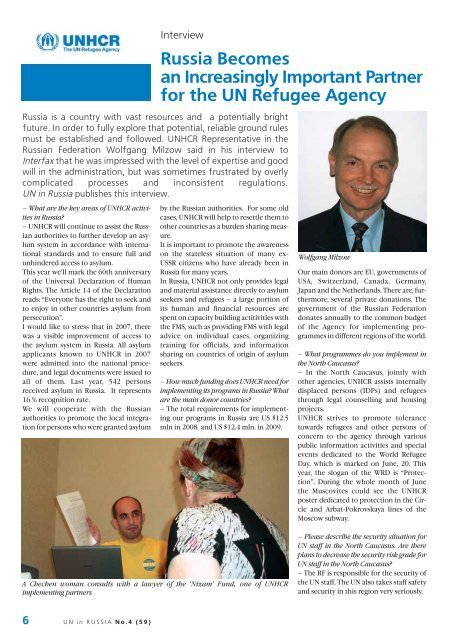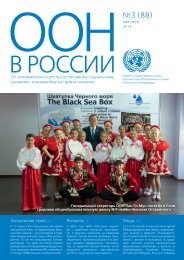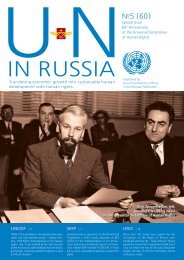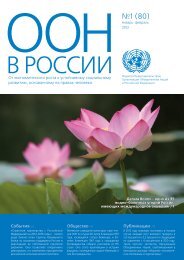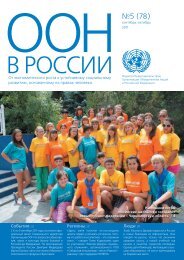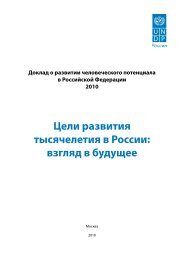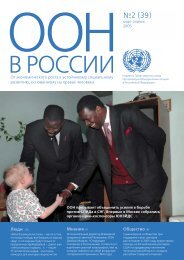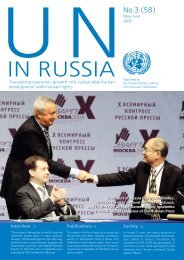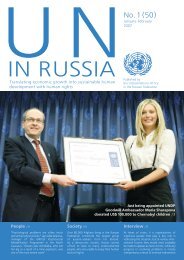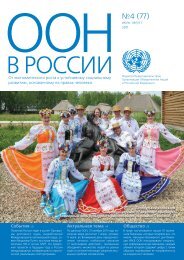Flagship Course: Health System Development - UN Russia
Flagship Course: Health System Development - UN Russia
Flagship Course: Health System Development - UN Russia
Create successful ePaper yourself
Turn your PDF publications into a flip-book with our unique Google optimized e-Paper software.
– What are the key areas of <strong>UN</strong>HCR activities<br />
in <strong>Russia</strong>?<br />
– <strong>UN</strong>HCR will continue to assist the <strong>Russia</strong>n<br />
authorities to further develop an asylum<br />
system in accordance with international<br />
standards and to ensure full and<br />
unhindered access to asylum.<br />
This year we’ll mark the 60th anniversary<br />
of the Universal Declaration of Human<br />
Rights. The Article 14 of the Declaration<br />
reads: “Everyone has the right to seek and<br />
to enjoy in other countries asylum from<br />
persecution”.<br />
I would like to stress that in 2007, there<br />
was a visible improvement of access to<br />
the asylum system in <strong>Russia</strong>. All asylum<br />
applicants known to <strong>UN</strong>HCR in 2007<br />
were admitted into the national procedure,<br />
and legal documents were issued to<br />
all of them. Last year, 542 persons<br />
received asylum in <strong>Russia</strong>. It represents<br />
16 % recognition rate.<br />
We will cooperate with the <strong>Russia</strong>n<br />
authorities to promote the local integration<br />
for persons who were granted asylum<br />
6<br />
<strong>UN</strong> in RUSSIA No.4 (59)<br />
Interview<br />
<strong>Russia</strong> is a country with vast resources and a potentially bright<br />
future. In order to fully explore that potential, reliable ground rules<br />
must be established and followed. <strong>UN</strong>HCR Representative in the<br />
<strong>Russia</strong>n Federation Wolfgang Milzow said in his interview to<br />
Interfax that he was impressed with the level of expertise and good<br />
will in the administration, but was sometimes frustrated by overly<br />
complicated processes and inconsistent regulations.<br />
<strong>UN</strong> in <strong>Russia</strong> publishes this interview.<br />
by the <strong>Russia</strong>n authorities. For some old<br />
cases, <strong>UN</strong>HCR will help to resettle them to<br />
other countries as a burden sharing measure.<br />
It is important to promote the awareness<br />
on the stateless situation of many ex-<br />
USSR citizens who have already been in<br />
<strong>Russia</strong> for many years.<br />
In <strong>Russia</strong>, <strong>UN</strong>HCR not only provides legal<br />
and material assistance directly to asylum<br />
seekers and refugees – a large portion of<br />
its human and financial resources are<br />
spent on capacity building actitivities with<br />
the FMS, such as providing FMS with legal<br />
advice on individual cases, organizing<br />
training for officials, and information<br />
sharing on countries of origin of asylum<br />
seekers.<br />
– How much funding does <strong>UN</strong>HCR need for<br />
implementing its programs in <strong>Russia</strong>? What<br />
are the main donor countries?<br />
– The total requirements for implementing<br />
our programs in <strong>Russia</strong> are US $12.5<br />
mln in 2008 and US $12.4 mln. in 2009.<br />
A Chechen woman consults with a lawyer of the ‘Nizam’ Fund, one of <strong>UN</strong>HCR<br />
implementing partners<br />
<strong>Russia</strong> Becomes<br />
an Increasingly Important Partner<br />
for the <strong>UN</strong> Refugee Agency<br />
Wolfgang Milzow<br />
Our main donors are EU, governments of<br />
USA, Switzerland, Canada, Germany,<br />
Japan and the Netherlands. There are, furthermore,<br />
several private donations. The<br />
government of the <strong>Russia</strong>n Federation<br />
donates annually to the common budget<br />
of the Agency for implementing programmes<br />
in different regions of the world.<br />
– What programmes do you implement in<br />
the North Caucasus?<br />
– In the North Caucasus, jointly with<br />
other agencies, <strong>UN</strong>HCR assists internally<br />
displaced persons (IDPs) and refugees<br />
through legal counselling and housing<br />
projects.<br />
<strong>UN</strong>HCR strives to promote tolerance<br />
towards refugees and other persons of<br />
concern to the agency through various<br />
public information activities and special<br />
events dedicated to the World Refugee<br />
Day, which is marked on June, 20. This<br />
year, the slogan of the WRD is “Protection”.<br />
During the whole month of June<br />
the Muscovites could see the <strong>UN</strong>HCR<br />
poster dedicated to protection in the Circle<br />
and Arbat-Pokrovskaya lines of the<br />
Moscow subway.<br />
– Please describe the security situation for<br />
<strong>UN</strong> staff in the North Caucasus. Are there<br />
plans to decrease the security risk grade for<br />
<strong>UN</strong> staff in the North Caucasus?<br />
– The RF is responsible for the security of<br />
the <strong>UN</strong> staff. The <strong>UN</strong> also takes staff safety<br />
and security in this region very seriously.


